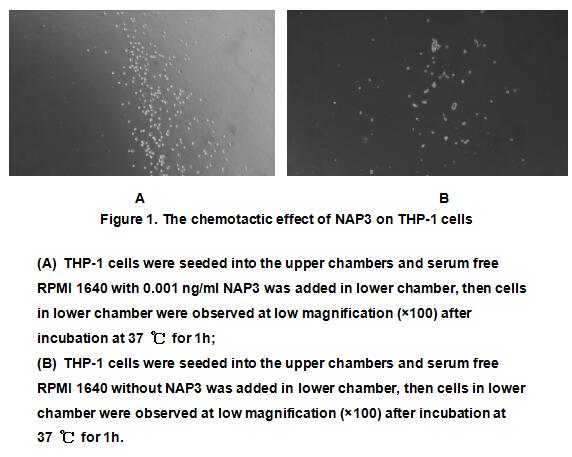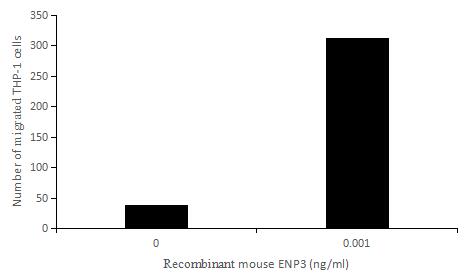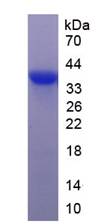Active Chemokine (C-X-C Motif) Ligand 1 (CXCL1)
NAP3; GRO1; GROa; GRO-A; MGSA-A; NAP3; SCYB1; Chemokine C-X-C-Motif Ligand 1; Melanoma Growth Stimulating Activity Alpha; Fibroblast Secretory Protein
- Product No.APA041Mu02
- Organism SpeciesMus musculus (Mouse) Same name, Different species.
- Buffer FormulationPBS, pH7.4, containing 0.01% SKL, 5% Trehalose.
- Traits Freeze-dried powder
- Purity> 90%
- Isoelectric Point7.6
- ApplicationsCell culture; Activity Assays.
- DownloadInstruction Manual
- UOM 10µg50µg 200µg 1mg 5mg
- FOB
US$ 242
US$ 605
US$ 1210
US$ 3630
US$ 9075
For more details, please contact local distributors!
ACTIVITY TEST

Neutrophil-activating protein 3 (NAP3) also known as chemokine (C-X-C motif) ligand 1 (CXCL1) is a small cytokine belonging to the CXC chemokine family. NAP3 is expressed by macrophages, neutrophils and epithelial cells,and has neutrophil chemoattractant activity. Thus, chemotaxis assay used 24-well microchemotaxis system was undertaken to detect the chemotactic effect of NAP3 on THP-1 the human monocytic cell line. Briefly, THP-1 cells were seeded into the upper chambers (150 ul cell suspension,106 cells/ml in RPMI 1640 with FBS free) and different concentrations of recombinant mouse NAP3 diluted with serum free RPMI 1640 was added in lower chamber with a polycarbonate filter (8 um pore size) used to separate the two compartments. After incubation at 37 ℃ with 5% CO2 for 1h, the filter was removed, then cells in low chamber were observed by inverted microscope at low magnification (×100) and the number of migrated cells were counted at high magnification(×400) randomly (five fields for each filter). Result shows recombinant mouse NAP3 is able to induce migration of THP-1 cells. The migrated THP-1 cells in low chamber at low magnification (×100) were shown in Figure 1. Statistical results were shown in Figure 2. The optimum chemotaxis of NAP3 occurs at 0.001 ng/ml.

Figure 2. The chemotactic effect of NAP3 on THP-1 cells
USAGE
Reconstitute in 10mM PBS (pH7.4) to a concentration of 0.1-1.0 mg/mL. Do not vortex.
STORAGE
Avoid repeated freeze/thaw cycles. Store at 2-8°C for one month. Aliquot and store at -80°C for 12 months.
STABILITY
The thermal stability is described by the loss rate. The loss rate was determined by accelerated thermal degradation test, that is, incubate the protein at 37°C for 48h, and no obvious degradation and precipitation were observed. The loss rate is less than 5% within the expiration date under appropriate storage condition.
GIVEAWAYS
INCREMENT SERVICES
-
 BCA Protein Quantification Kit
BCA Protein Quantification Kit
-
 Molecular Mass Marker for Protein
Molecular Mass Marker for Protein
-
 Monoclonal Antibody Customized Service
Monoclonal Antibody Customized Service
-
 Polyclonal Antibody Customized Service
Polyclonal Antibody Customized Service
-
 Protein Activity Test Experiment Service
Protein Activity Test Experiment Service
-
 Electrophoretic Mobility Shift Assay (EMSA) Experiment Service
Electrophoretic Mobility Shift Assay (EMSA) Experiment Service
-
 Buffer
Buffer
-
 Lentivirus Packaging Experiment Service
Lentivirus Packaging Experiment Service
-
 Adenovirus Packaging Experiment Service
Adenovirus Packaging Experiment Service
-
 Real Time PCR Experimental Service
Real Time PCR Experimental Service
-
 Spike RBD Protein (S-RBD)
Spike RBD Protein (S-RBD)
-
 Protein G
Protein G
-
 Protein A
Protein A
| Magazine | Citations |
| 中国眼耳鼻喉科杂志 | 白细胞介素10 上调表达对家兔慢性细菌性鼻窦炎黏膜创伤修复的影响 article:11593 |
| Scientific Reports | Epidermal CD147 expression plays a key role in IL-22-induced psoriatic dermatitis. pubmed:28272440 |
| Phytotherapy Research | Total flavonoids from sea buckthorn ameliorates lipopolysaccharide/cigarette smoke‐induced airway inflammation Pubmed: 31209984 |
| Frontiers in Oncology | CXCL1 as an Unfavorable Prognosis Factor Negatively Regulated by DACH1 in Non-small Cell Lung Cancer Pubmed: 31998654 |
| Phytomedicine | Baohuoside I suppresses breast cancer metastasis by downregulating the tumor-associated macrophages/CXC motif chemokine ligand 1 pathway Pubmed: 32911383 |
| Lab Invest | Extracellular cold-inducible RNA-binding protein regulates neutrophil extracellular trap formation and tissue damage in acute pancreatitis Pubmed: 32709888 |
| Phytomedicine | Aiduqing formula suppresses breast cancer metastasis via inhibiting CXCL1-mediated autophagy |
| Cell Commun Signal | Aiduqing formula inhibits breast cancer metastasis by suppressing TAM/CXCL1-induced Treg differentiation and infiltration 34461944 |
| Viruses | Interleukin-10-Mediated Lymphopenia Caused by Acute Infection with Foot-and-Mouth Disease Virus in Mice 34960627 |







